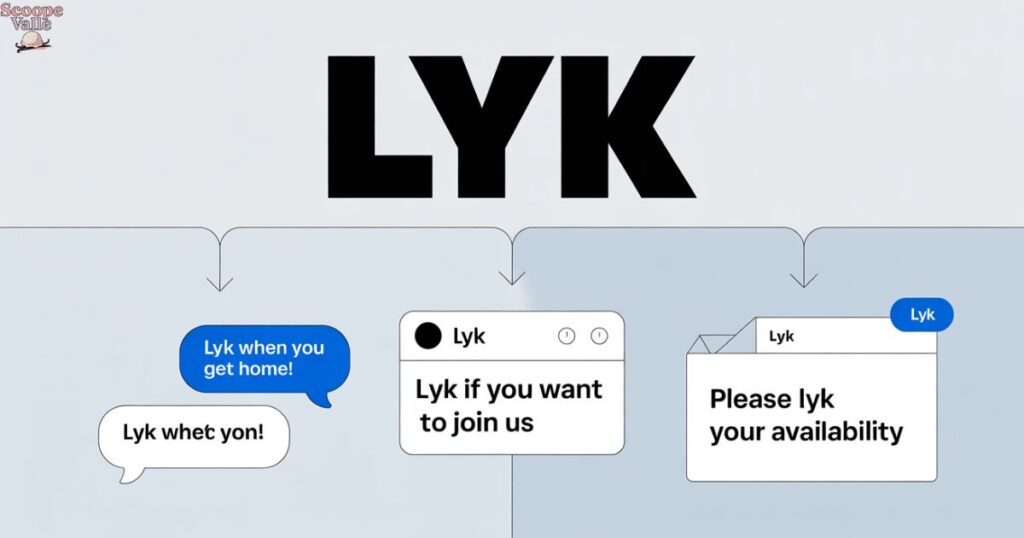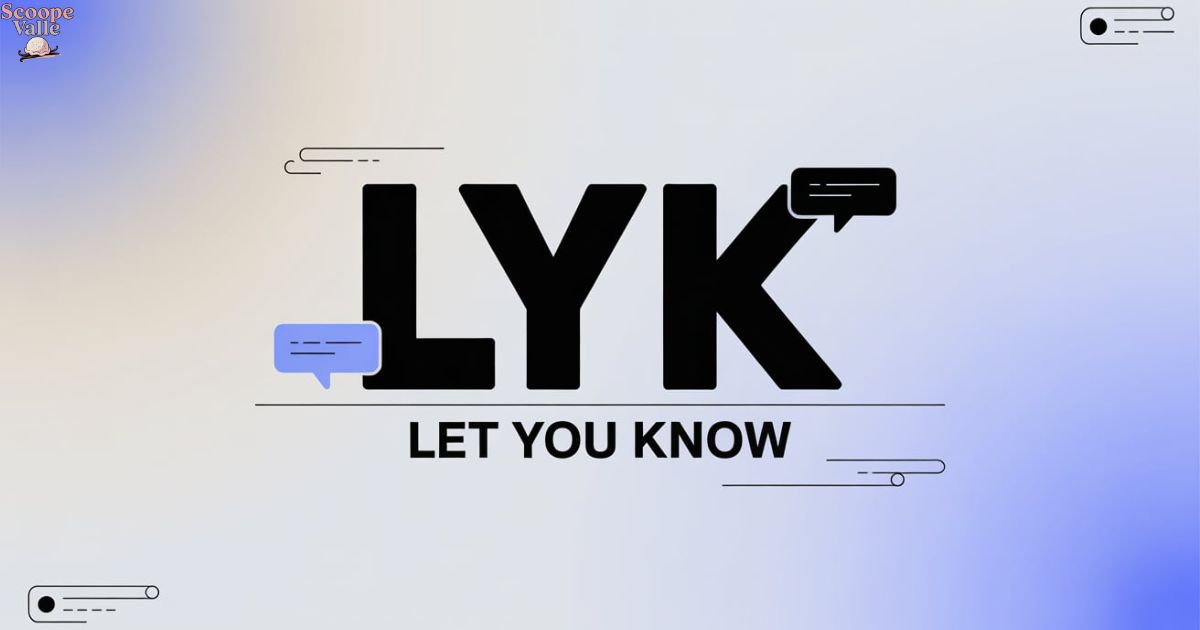Ever gotten a message that said “I’ll lyk” and found yourself pausing for a second? You’re not alone! With texting slang evolving faster than ever, it can be tricky to keep up. “LYK” is one of those short forms that often pop up in texts, DMs, and chatrooms. It’s casual, convenient, and perfect for quick conversations.
Definition & Meaning
“LYK” stands for “let you know.” It’s a shorthand used in texting and online chatting to tell someone that you’ll give them an update later.
For instance, if your friend asks about your weekend plans but you’re unsure, you might say, “I’ll lyk once I decide.”
It’s a friendly, time-saving way to communicate that you’ll provide information soon without typing the full sentence. The abbreviation helps keep messages short and natural perfect for quick conversations on phones or social apps.
Examples in Real Life
To understand “LYK” better, here are a few everyday examples:
- Friend Planning a Meetup:
“Not sure what time the movie starts yet—I’ll lyk!” - Work Chat (Casual Tone):
“Still waiting for the update from the client. Will lyk ASAP.” - Gaming Conversation:
“Need to finish this quest first—lyk when I’m ready.”
Also read: MMCHT Meaning in Text: Your Ultimate Guide to This Trendy Slang
Background & History
Like many internet abbreviations, “LYK” originated in the early 2000s, during the rise of SMS texting. Back then, character limits were tight—just 160 characters per message. To save space and time, people started using short forms such as “u” for “you,” “brb” for “be right back,” and “lyk” for “let you know.”
As technology evolved, the abbreviation carried over to social media platforms like Facebook, Twitter, and Instagram. Even today, “LYK” remains popular among younger generations who love quick, efficient ways to communicate. Although it’s not as formal or common as “LMK” (let me know), it still holds a place in modern online language.
Usage in Different Contexts

1. Texting & Social Media
“LYK” is widely used in texting, DMs, and comment sections. It’s especially handy when you’re unsure about something and plan to confirm it later.
Example:
“I might come to your party—I’ll lyk once I check my schedule.”
It helps maintain the flow of conversation while signaling that you’ll follow up later.
2. Gaming
Gamers often use “LYK” in chats where typing long sentences isn’t practical. It’s perfect for real-time updates or coordination during gameplay.
Example:
“Enemy near your area—lyk if you need backup.”
Here, “LYK” keeps communication fast and efficient without breaking focus.
3. Work (Informal Only!)
In workplace chats, “LYK” can be used only with colleagues you know well. It’s not suitable for emails or formal discussions but can work in quick internal messages.
Example:
“Still reviewing the report—will lyk when I’m done.”
Remember, professionalism matters. Keep it casual only when the tone allows it.
Common Misconceptions
There are a few misunderstandings surrounding “LYK”:
- ❌ It doesn’t mean “like.” Some people confuse “lyk” with the misspelling of “like,” especially in older internet slang. Always check the context.
- ❌ It’s not rude or dismissive. Using “LYK” simply means you’ll inform someone later—it doesn’t sound careless unless overused.
- ⚠️ Avoid it in formal communication. It’s best suited for informal chats with friends or peers.
Similar Terms & Alternatives
| Term | Meaning | Best Used In |
|---|---|---|
| LYK | Let you know | Casual chats |
| LMK | Let me know | Slightly more formal |
| TTYL | Talk to you later | Ending conversations |
| FYI | For your information | Work updates |
| BRB | Be right back | Online conversations |
How to Respond to “LYK”
Your reply to “LYK” depends on the context and tone of the conversation.
- Casual Response:
“Cool, thanks!” or “Alright, no worries.” - Funny Response:
“Don’t keep me waiting too long! 😆” - Professional Response:
“Sounds good—keep me updated.”
Regional & Cultural Differences
“LYK” is mostly used in English-speaking countries such as the United States, United Kingdom, and Canada. In non-English-speaking regions, it’s less common since people often use native-language abbreviations or prefer the full phrase “let you know.”
Hidden or Offensive Meanings?
No need to worry “LYK” doesn’t have any hidden, rude, or offensive meanings. It’s purely a harmless abbreviation meant for casual updates.
Just don’t mix it up with “lyke,” an old internet slang spelling for “like,” which has a different meaning.
Professional Use?
When it comes to work or formal communication, avoid using “LYK.”
While it’s fine in informal team chats, it’s not suitable for professional emails, presentations, or reports. Instead, use clearer and more polished alternatives such as:
- “I’ll update you soon.”
- “I’ll let you know once I have more details.”
- “I’ll keep you informed.”
FAQ’s
Is “LYK” rude?
No, it’s not rude—it’s simply informal and best for friendly conversations.
Can I use “LYK” in a work email?
It’s better to avoid it. Instead, write the full phrase “I’ll let you know.”
What’s the difference between “LYK” and “LMK”?
“LYK” means I’ll let you know, while “LMK” means you let me know.
Is “LYK” used on dating apps?
Yes! It’s common in casual chats like, “I’ll lyk if I’m free Friday.”
Do older people use “LYK”?
Rarely—it’s mostly used by Gen Z and millennials who are active online.
Conclusion
To wrap it up, “LYK” stands for “let you know,” a simple abbreviation that saves time in digital communication. It’s ideal for texting, gaming, and casual online chats. However, remember that tone and context matter—what’s fun with friends might not suit formal settings.
Tylor John, with five years’ experience, beautifully crafts information on all topics and inspiring readers worldwide with positivity, faith, creativity, love, and hope.

